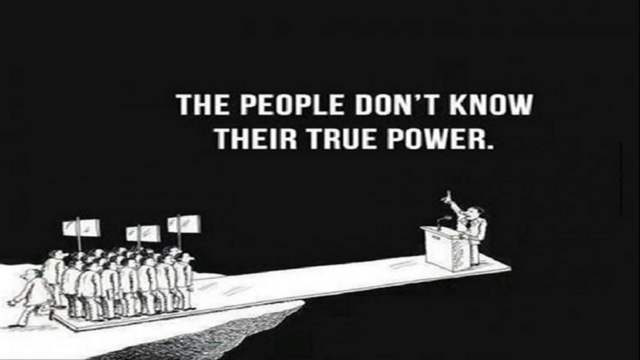Anarchic Discussions 2: Power Vacuums

"But Without Government, Warlords Take Over!"
The most common, semi logical argument against anarchy is "without the government, warlords would take over". I say "semi logical" because a) the most common argument is to throw ad hominem aspersions around, and b) the logic is not as sound as it seems.
The Statist Power Vacuum Argument
It sounds compelling, I'll wholeheartedly agree. In fact, back before I realised how viable anarchy actually is, it was the last bastion of defence I had. I believed back then that none could challenge it. The power vacuum that results from the collapse of a government leads to another government, often one that few in society actually desire. This is what I believed for years, until some other voluntaryists managed to demonstrate how my mind was unknowingly engaging in a composition fallacy & an appeal to tradition.
Power Vacuums Are Not So Straight Forward
The power vacuum issue is a red herring. Power vacuums exist in failed states because critical services, like rights enforcement and dispute resolution, are no longer being provided. Such services would be privately provided on a free market in anarchic system of governance, hence the reason why using failed states to describe the outcome of Anarchism is a strawman argument. Power vacuums exist only when a critical service is completely removed. If the private providers of said service already exist, no vacuums can arise.
It is therefore imperative to any society attempting the voluntaryism route to have private providers ready to pick up the slack & start their own companies for individuals to contract with. Ideally, these should exist before the state is abolished. If you want to learn more about the kinds of conflict resolution solutions that could exist within a free market, this video does an excellent job of explaining those options.
The links provided in this article are reference materials only. No claim is being made to ownership of said reference material.
To be quite honest, I'm an AnCap myself (as is probably obvious, judging by my nickname), but I think that if the state 'suddenly' crashed, we'd be in a bit of a pickle. People are not at all adjusted to life without the government.
A better idea, in my opinion, would be to slowly but surely dissolve more and more parts of the government. Allow private education, lower taxes, privatize more stuff, lower taxes... etc.
Still, you make some good points for when the state truly has dissolved. People don't realize that just because things are the way they are now, it doesn't mean that it's the best way of doing things.
Thank you for your reply @ancapdude. To be frank, you are correct. If the state magically vanished tomorrow, our society would likely descend into infighting for a vast majority. People are not used to actually having to use agency, and take responsibility for everything they do. That said, I don't advocate that the state should spontaneously vanish. Well, not often at least.
My view is that the transition between now and a free society requires a migration from centralised, federal government, to a decentralised network of local governance. All forms of governance should be contractually agreed with the individuals within. This allows for voluntary survival, while providing the services critical to a stable society.
Eventually, as the local providers encounter free market solutions, those services may be adopted instead of having it monopolised by the community at large. The efficiency of capitalism will shine through in the end. However, we need to educate others first before such a change has a chance to occur.